Search results for: 'work from home admin jobs part time south shields'
- Related search terms
- from prison to paradise r.e.a.d to succeed
- part 3,www.fmsproductions.com/catalogsearch/result/index?p,fmsproductions.com,0.11034103
- Part 2: Setting personal boundaries'nvOpzp; AND 1=1 OR (<'">iKO)),
- part 3 and part 4 of unwind
- part, a vibrating screen and a fan are selected to separate the hazelnut shell from the hazelnut kernel. Using the electric moto
-
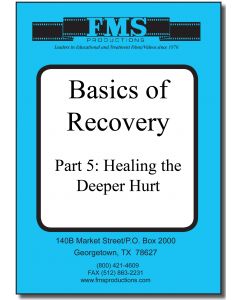 Basics of Recovery Part 5Special Price $149.00 Regular Price $249.00Part 5: Healing the Deeper Hurt Learn More
Basics of Recovery Part 5Special Price $149.00 Regular Price $249.00Part 5: Healing the Deeper Hurt Learn More -
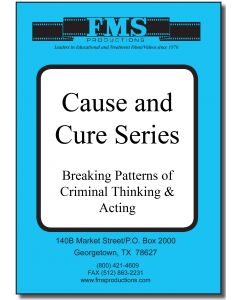 Cause & Cure Series Part 4Special Price $150.00 Regular Price $200.00Part 4: Breaking Patterns of Criminal Thinking & Acting Habits Learn More
Cause & Cure Series Part 4Special Price $150.00 Regular Price $200.00Part 4: Breaking Patterns of Criminal Thinking & Acting Habits Learn More -
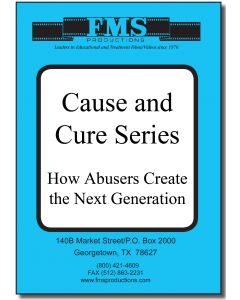 Cause & Cure Series Part 3Special Price $150.00 Regular Price $200.00Part 3 : How Abusers Create the Next Generation Learn More
Cause & Cure Series Part 3Special Price $150.00 Regular Price $200.00Part 3 : How Abusers Create the Next Generation Learn More -
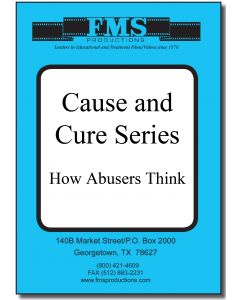 Cause & Cure Series Part 2Special Price $150.00 Regular Price $200.00Part 2: How Abusers Think Learn More
Cause & Cure Series Part 2Special Price $150.00 Regular Price $200.00Part 2: How Abusers Think Learn More -
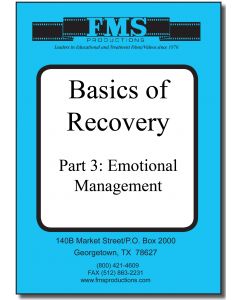 Basics of Recovery Part 3Special Price $149.00 Regular Price $249.00Part 3: Emotional Management Learn More
Basics of Recovery Part 3Special Price $149.00 Regular Price $249.00Part 3: Emotional Management Learn More -
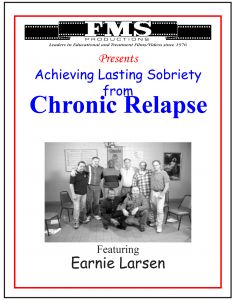 Chronic Relapse Part 3: Pebbles Around the BoulderSpecial Price $224.00 Regular Price $299.00In this dynamic and compelling three-part program, Earnie Larsen, a nationally known author and lecturer, and a pioneer in the field of recovery, brings together a group of ex-offenders and recovery addicts. The program revolves around the concept that "chemicals medicate pain." Learn More
Chronic Relapse Part 3: Pebbles Around the BoulderSpecial Price $224.00 Regular Price $299.00In this dynamic and compelling three-part program, Earnie Larsen, a nationally known author and lecturer, and a pioneer in the field of recovery, brings together a group of ex-offenders and recovery addicts. The program revolves around the concept that "chemicals medicate pain." Learn More -
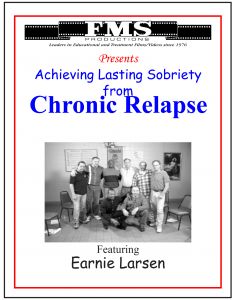 Chronic Relapse Part 2: Breaking the Relapse CycleSpecial Price $224.00 Regular Price $299.00In this dynamic and compelling three-part program, Earnie Larsen, a nationally known author and lecturer, and a pioneer in the field of recovery, brings together a group of ex-offenders and recovery addicts. The program revolves around the concept that "chemicals medicate pain." Learn More
Chronic Relapse Part 2: Breaking the Relapse CycleSpecial Price $224.00 Regular Price $299.00In this dynamic and compelling three-part program, Earnie Larsen, a nationally known author and lecturer, and a pioneer in the field of recovery, brings together a group of ex-offenders and recovery addicts. The program revolves around the concept that "chemicals medicate pain." Learn More -
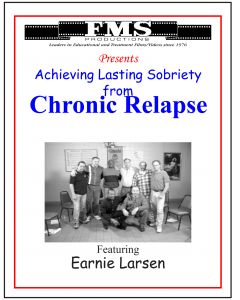 Chronic Relapse Part 1: Understanding RelapseSpecial Price $224.00 Regular Price $299.00In this dynamic and compelling three-part program, Earnie Larsen, a nationally known author and lecturer, and a pioneer in the field of recovery, brings together a group of ex-offenders and recovery addicts. The program revolves around the concept that "chemicals medicate pain." Learn More
Chronic Relapse Part 1: Understanding RelapseSpecial Price $224.00 Regular Price $299.00In this dynamic and compelling three-part program, Earnie Larsen, a nationally known author and lecturer, and a pioneer in the field of recovery, brings together a group of ex-offenders and recovery addicts. The program revolves around the concept that "chemicals medicate pain." Learn More -
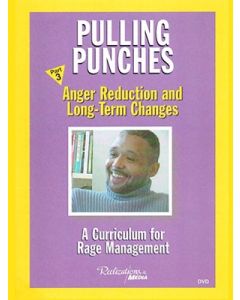 Pulling Punches: Part 3 – Anger Reduction and Long Term ChangesSpecial Price $195.00 Regular Price $249.00How to become a less angry person! Learn More
Pulling Punches: Part 3 – Anger Reduction and Long Term ChangesSpecial Price $195.00 Regular Price $249.00How to become a less angry person! Learn More -
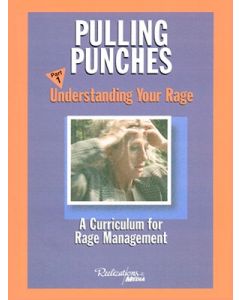 Pulling Punches: Part 1 – Understanding Your RageSpecial Price $195.00 Regular Price $249.00Even clients in denial about their anger problem will identify with these true stories. Learn More
Pulling Punches: Part 1 – Understanding Your RageSpecial Price $195.00 Regular Price $249.00Even clients in denial about their anger problem will identify with these true stories. Learn More -
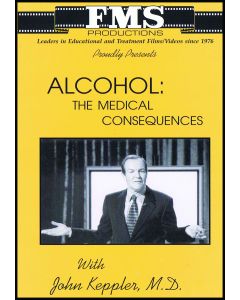 Alcohol: The Medical Consequences Part ISpecial Price $259.00 Regular Price $349.00Computer graphics and brain scans illustrate precisely what alcohol is capable of inside the human body. Learn More
Alcohol: The Medical Consequences Part ISpecial Price $259.00 Regular Price $349.00Computer graphics and brain scans illustrate precisely what alcohol is capable of inside the human body. Learn More -
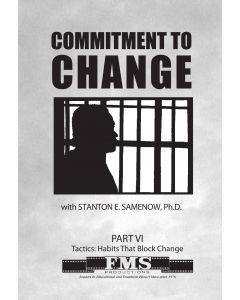 Commitment to Change Part 6: Ways to Overcome Tactics$399.00Part 6: Ways to Overcome Tactics In this section, the group takes a hard look at practical, step-by-step ways to move beyond tactics and open the way toward a life that is truly free. Volume II Tactics: Habits that Block Change is a 3-part series, and is the second of 3 volumes in the entire Commitment to Change Series. Learn More
Commitment to Change Part 6: Ways to Overcome Tactics$399.00Part 6: Ways to Overcome Tactics In this section, the group takes a hard look at practical, step-by-step ways to move beyond tactics and open the way toward a life that is truly free. Volume II Tactics: Habits that Block Change is a 3-part series, and is the second of 3 volumes in the entire Commitment to Change Series. Learn More -
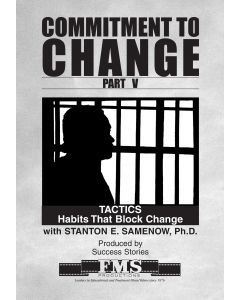 Commitment to Change Part 5: More TacticsSpecial Price $299.00 Regular Price $399.00Part 5: More Tactics Includes these tactics- Casing People Out: "I'll feed you what you want to hear." Generalizing: "Everybody does it. Why not me?" Silence: "I don't feel safe; I'll shut down (and take control)." Learn More
Commitment to Change Part 5: More TacticsSpecial Price $299.00 Regular Price $399.00Part 5: More Tactics Includes these tactics- Casing People Out: "I'll feed you what you want to hear." Generalizing: "Everybody does it. Why not me?" Silence: "I don't feel safe; I'll shut down (and take control)." Learn More -
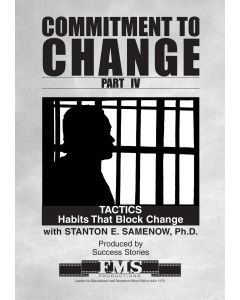 Commitment to Change Part 4: Crucial Tactics Revealed$399.00Part 4: Crucial Tactics Revealed Includes these tactics- Attack: "You're the problem; not me." Diversion: "I'll change the subject." Minimizing: "It's no big deal." Learn More
Commitment to Change Part 4: Crucial Tactics Revealed$399.00Part 4: Crucial Tactics Revealed Includes these tactics- Attack: "You're the problem; not me." Diversion: "I'll change the subject." Minimizing: "It's no big deal." Learn More -
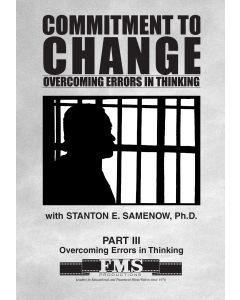 Commitment to Change Part 3Special Price $299.00 Regular Price $399.00Part 3: Overcoming Errors in Thinking One final error demonstrates how change can begin. "It's okay to shut off fear" is the error examined. Volume I Overcoming Errors in Thinking is a 3-part series, and is the first of 3 volumes in the entire Commitment to Change Series. Learn More
Commitment to Change Part 3Special Price $299.00 Regular Price $399.00Part 3: Overcoming Errors in Thinking One final error demonstrates how change can begin. "It's okay to shut off fear" is the error examined. Volume I Overcoming Errors in Thinking is a 3-part series, and is the first of 3 volumes in the entire Commitment to Change Series. Learn More -
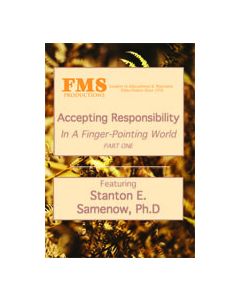 Accepting Responsibility Part 2Special Price $299.00 Regular Price $399.00In part 2 of Accepting Responsibility In a Finger-Pointing World, renowned expert in criminal thinking, Dr. Stanton Samenow, explores the concepts of justification thinking errors with a group of ex-offenders who are currently in recovery. Learn More
Accepting Responsibility Part 2Special Price $299.00 Regular Price $399.00In part 2 of Accepting Responsibility In a Finger-Pointing World, renowned expert in criminal thinking, Dr. Stanton Samenow, explores the concepts of justification thinking errors with a group of ex-offenders who are currently in recovery. Learn More -
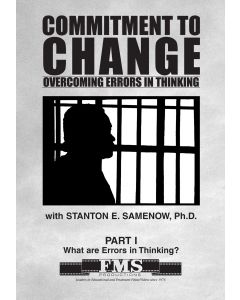 Commitment to Change Part ISpecial Price $299.00 Regular Price $399.00Part 1: What are Errors in Thinking? Provides a vivid introduction to the basic concept: The way we think has powerful influence on our lives. The opening captures viewer interest as it portrays the "high" of crime and drug abuse, followed by the inevitable, painful consequences. Learn More
Commitment to Change Part ISpecial Price $299.00 Regular Price $399.00Part 1: What are Errors in Thinking? Provides a vivid introduction to the basic concept: The way we think has powerful influence on our lives. The opening captures viewer interest as it portrays the "high" of crime and drug abuse, followed by the inevitable, painful consequences. Learn More -
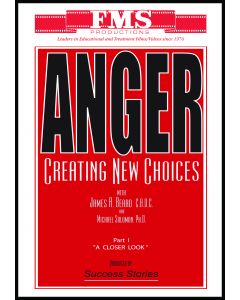 Anger: Creating New Choices Part III-Practical Skills$399.00Part III-Practical Skills Learning practical skills for "keeping things cool" - for being assertive instead of aggressive - opens a new door, giving us the ability to do something different: the power to create new choices. Learn More
Anger: Creating New Choices Part III-Practical Skills$399.00Part III-Practical Skills Learning practical skills for "keeping things cool" - for being assertive instead of aggressive - opens a new door, giving us the ability to do something different: the power to create new choices. Learn More -
 Anger: Creating New Choices Part II-Catch It Early$399.00Part II- Catch it Early When anger begins to grow, adrenaline flows and major changes take place in our bodies. Learning how to notice these changes, pictures and behaviors allows us to see what's coming before it's too late. Learn More
Anger: Creating New Choices Part II-Catch It Early$399.00Part II- Catch it Early When anger begins to grow, adrenaline flows and major changes take place in our bodies. Learning how to notice these changes, pictures and behaviors allows us to see what's coming before it's too late. Learn More -
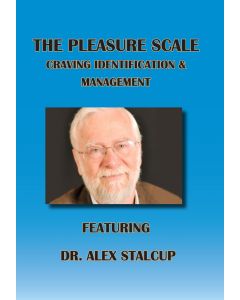 Pleasure Scale, Cravings Identification & Management Part 2Special Price $224.00 Regular Price $299.00Part 2 contains chapters 10-14 Learn More
Pleasure Scale, Cravings Identification & Management Part 2Special Price $224.00 Regular Price $299.00Part 2 contains chapters 10-14 Learn More
